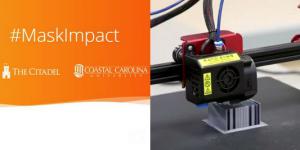First N95 Masks Produced Using 3-D Laser Printers Delivered To Medical University of South Carolina Hospital
The innovative production of the masks was the brainchild of Dr. James Bezjian, a professor at The Citadel. After consulting with MUSC, Bezjian and some of his students came up with the idea of creating N95 equivalent masks using 3-D laser printers, a potentially revolutionary way of producing the life-saving medical gear.
The primary challenge the Charleston-based college faced was a lack of 3-D printers on campus, a problem Citadel senior West Courtney worked tirelessly to solve. Courtney began brainstorming ideas with his college roommate, Will Golden, an exercise that led him to reach out to colleges, universities and public school systems across the Palmetto State.
Courtney’s effort led to a network that produced the masks that were delivered to MUSC, the final step in fast-tracking FDA approval.
Courtney’s relationship with Will Golden also led to Golf Tourism Solutions, a Myrtle Beach-based golf marketing and technology company. GTS CEO Bill Golden, Will’s father, embraced the opportunity to help.
GTS built the website MaskImpact.com, allowing people across the globe to register and download files necessary to print the masks, if they have access to a 3-D laser printer.
“People across the nation are looking for ways to help in the fight against the COVID-19 pandemic, and the ability for anyone with access to a laser printer to produce a life-saving mask for our healthcare workers could be a game-changer,” West said. “People from across the state of South Carolina united to make this possible, and we certainly hope the effort spreads across the United States and even the globe.”
Printing of the masks takes 4-5 hours, highlighting the need to utilize printers that might otherwise be dormant, but assembly takes less than 10 minutes. The cost to produce a mask using 3-D printing technology is approximately $4.
While the idea for the masks was born at Citadel, the success of the project was enabled by the cooperative spirit of the higher education community in South Carolina. Coastal Carolina University, which has partnered with Citadel to advance the effort, embraced the effort from the beginning.
CCU President David A. DeCenzo issued a call for institutions and organizations statewide to contribute their 3D printers to the cause. Since then, the S.C. Commission for Higher Education (CHE) applied for and received funds from the South Carolina Department of Health and Environmental Control (DHEC) to support state universities in printing the masks.
“This project shows how we can all come together in innovative ways in times of great need to provide a service that directly and immediately impacts those on the front lines,” DeCenzo said.
For more information, visit MaskImpact.com.
Chris King
Kingfish Communications
+1 843-685-1364
email us here
Legal Disclaimer:
EIN Presswire provides this news content "as is" without warranty of any kind. We do not accept any responsibility or liability for the accuracy, content, images, videos, licenses, completeness, legality, or reliability of the information contained in this article. If you have any complaints or copyright issues related to this article, kindly contact the author above.

